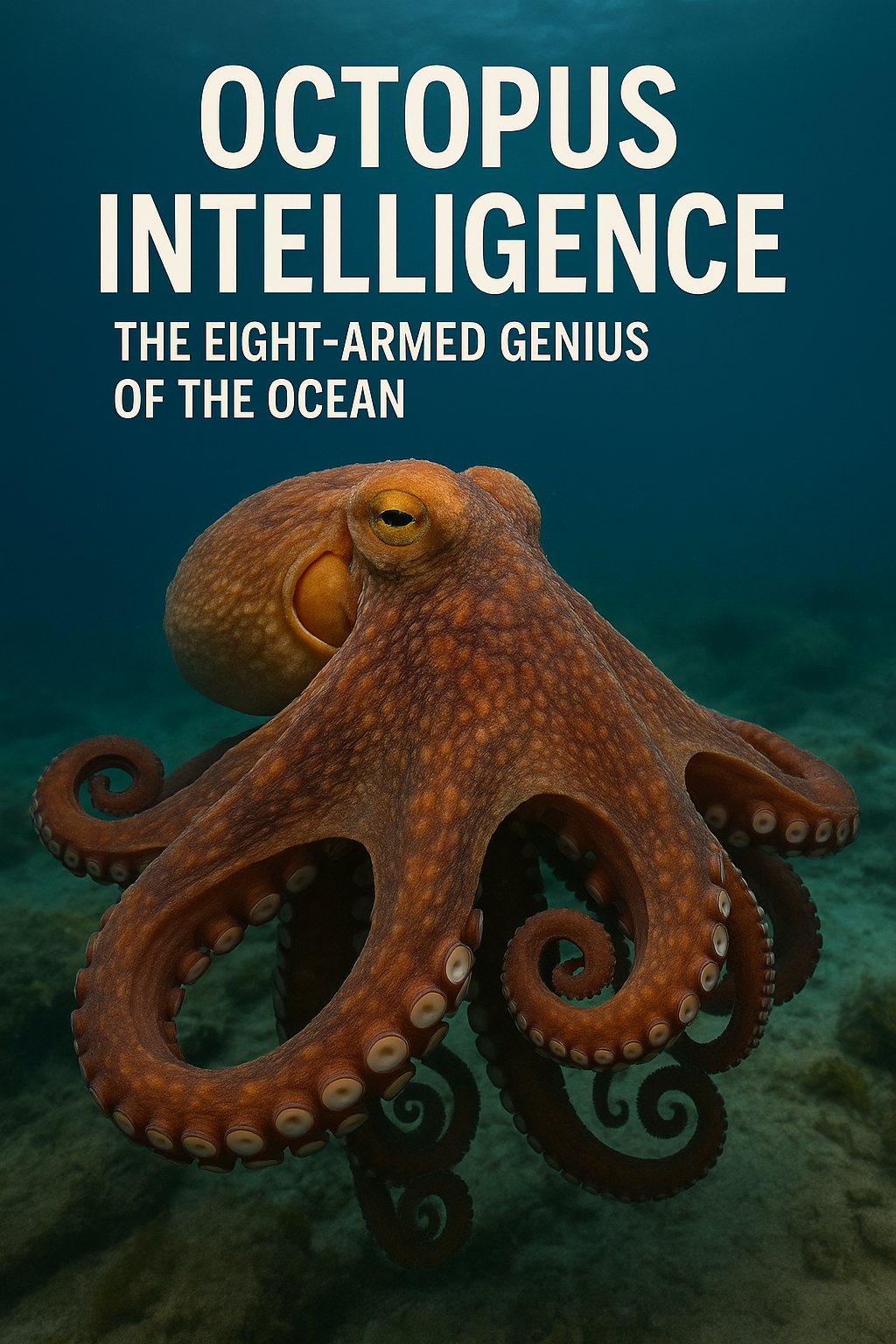Beneath the waves, an alien-like intelligence thrives—one with nine brains, blue blood, and the ability to solve complex puzzles. The octopus is not just a master of camouflage; it’s one of Earth’s most sophisticated invertebrates, capable of tool use, memory, and even playful behavior.
Scientists now believe octopuses possess a form of intelligence unlike any other creature—raising questions about consciousness, evolution, and what it truly means to be “smart.”
In this article, you’ll discover:
-
How octopus intelligence works (and why it’s so different from vertebrates)
-
Real-world examples of octopus problem-solving and creativity
-
The shocking complexity of their nervous system
-
What octopuses teach us about the nature of intelligence
1. The Octopus Brain: A Neural Network Unlike Any Other
Octopuses don’t think like mammals—their intelligence is distributed across multiple brains:
✔ Central brain – Processes vision and decision-making.
✔ Eight mini-brains – One in each arm, allowing independent movement.
✔ 500 million neurons – More than a rat (but structured differently).
Key Difference:
-
Vertebrates (like humans) rely on centralized brains.
-
Octopuses use a decentralized system, making them incredibly flexible thinkers.
2. Problem-Solving Feats: Proof of Octopus Genius
A. Tool Use (Yes, Really!)
-
Veined octopuses carry coconut shells to build mobile shelters.
-
Common octopuses use rocks to barricade den entrances.
B. Escape Artist Abilities
-
Octopuses in labs unscrew jars, open latches, and squeeze through tiny gaps.
-
Famous case: Inky the octopus escaped a New Zealand aquarium by sliding through a drainpipe to the ocean.
C. Playful Behavior
-
Some octopuses play with LEGO blocks or shoot water at objects for fun.
-
A 2023 study confirmed they exhibit curiosity, a trait once thought unique to mammals.
3. Camouflage: The Ultimate Disguise
Octopuses don’t just change color—they mimic textures and shapes:
✔ Chromatophores – Pigment cells that shift colors in milliseconds.
✔ Papillae – Muscles that alter skin texture to resemble rocks or coral.
✔ Mimicry – Some species impersonate sea snakes or lionfish to scare predators.
Example: The mimic octopus can imitate at least 15 different species.
4. Memory and Learning: Do Octopuses Get Smarter With Age?
-
Octopuses recognize individual humans (even after months apart).
-
They learn by observation—one study showed they could copy another octopus opening a jar.
-
Short lifespans (1-5 years) mean they must learn quickly.
Controversy: Some scientists argue they don’t “remember” like mammals but reprogram their neurons on the fly.
5. Why Are Octopuses So Intelligent? The Evolutionary Mystery
Most intelligent animals (dolphins, primates, crows) are social—but octopuses are solitary. So why did they evolve such advanced brains?
Leading Theories:
✔ Predator-rich environments – Need for constant adaptability.
✔ Complex hunting strategies – Some octopuses “fish” by tapping prey with their arms.
✔ Arm autonomy – Each limb acts semi-independently, requiring high-level coordination.
Mind-Blowing Fact: Their intelligence may have evolved twice independently—in octopuses and their close relatives, cuttlefish.
6. Octopus Consciousness: Do They Experience the World Like We Do?
Recent research suggests octopuses might have a primitive form of consciousness:
✔ Dreaming? Some change colors while sleeping, possibly replaying memories.
✔ Self-awareness? They interact with mirrors unusually, but fail classic “self-recognition” tests.
✔ Pain perception – They avoid injury and seek pain relief, indicating discomfort awareness.
Ethical Debate: Should octopuses be granted rights similar to lab mammals?
7. What Octopus Intelligence Teaches Us About Alien Minds
Octopuses are the closest thing to aliens on Earth—their intelligence evolved entirely separately from vertebrates. Studying them helps us:
✔ Redefine intelligence (it doesn’t require a centralized brain).
✔ Imagine extraterrestrial life (how might otherworldly creatures think?).
✔ Improve robotics (soft, flexible AI inspired by octopus arms).
Conclusion: The Ocean’s Most Mysterious Genius
Octopuses challenge everything we thought we knew about intelligence. As research continues, they may unlock secrets about neuroscience, AI, and even the origins of consciousness itself.
Next time you see an octopus, remember: you’re looking at one of evolution’s most brilliant experiments.




Leave a Comment